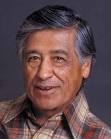PORTLAND — People will gather Thursday to celebrate the birthday of Cesar Estrada Chavez. Robert F. Kennedy characterized him as “one of the heroic figures of our time.”
The meeting, at 9 a.m. at First Parish Unitarian Universalist Church on Congress Street, will be an observance that will include but go beyond Cesar’s organization of this nation’s poorest rural workers into the United Farm Workers of America.
It will be Cesar in his complexity and universality: Cesar the educated man, voices of his prayer, faith, music, environmental sensitivity and human rights. A Cesar who goes to the moral core of collective organizing as a civil right for working people. My voice will speak of Cesar the all-American.
The Maine League of United Latin American Citizens observance comes amid a political climate symbolized by the February testimony we gave against a “birther” bill before a state legislative committee. The legislation required candidates for elective office to prove citizenship.
We opined that the proposal deserved no legislative hearing because it is rooted in an extremist beliefs that our president is a noncitizen, and it energizes a racist past.
The mere introduction of such xenophobic legislation betrays Maine’s demographic reality. For this whitest and oldest state in the union, in contrast to states like Arizona, immigration is a non-issue.
But understanding Cesar’s humanity is critical for Maine’s future. Like Gandhi and Martin Luther King, his inner faith energized national sentiment. Through word and deed, Cesar organized against deplorable conditions affecting poor rural workers.
A child of racial segregation in a Los Angeles that was almost 80 percent white Protestant during the 1950s, I developed a sense of segregation’s injustice from Robert Conot’s “Rivers of Blood, Years of Darkness.” The book is about that city’s 1965 Watts Riots and prophesied a coming Chicano movement revolt in Los Angeles.
Cesar’s farmworker movement first came to notice in 1968, when then-presidential candidate Bobby Kennedy embraced him. Along with King, Kennedy was assassinated in that tumultuous year of countercultural and civil rights turmoil.
Student protests got me into college, after graduating in 1969 from a “Mexican” high school engulfed by citywide Chicano student walkouts. It made me a desegregation college activist and campaigner for George McGovern’s 1972 presidential campaign.
I was moved by Cesar’s endorsement of McGovern and joined UFW’s cofounder, Dolores Huerta, at a union rally for him. I was a guest during the 1970s at Cesar’s headquarters in La Paz, Calif. It was a time, Marc Grossman, Cesar’s spokesman, reminds me, when Chavez was told to “go back to Mexico.”
Last year, one of his granddaughters, a third-generation American, was challenged about her immigration status, and it was suggested that Cesar’s body be deported to Mexico.
“What is ironic,” Grossman told me, “is that the Chavez family has been in this country longer than many Americans.” Fleeing from servitude in Mexico, Cesar’s grandfather, Cesario, settled in Arizona and received property through the 1862 Homestead Act.
One of Cesar’s uncles witnessed the legendary 1881 gunfight at the OK Corral in Tombstone, Ariz.
“In the late 1800s, his grandfather ran a business cutting wood, hauling it in wagons pulled by mule teams that built mines.” Before Arizona became a state, his business contributed to the nation’s “19th-century Internet” there: the railroads. At the turn of the century, Cesar’s dad, Librado, drove a Wells Fargo stagecoach and was a farmer, local postmaster and ran a country store that was a gathering place for Anglos and Latinos. The Chavez family helped build the Old West.
Born on March 31, 1931, in Arizona, Cesar served in the military. Like the Depression-era Okies in John Steinbeck’s “Grapes of Wrath,” his family lost their property to the banks and migrated to California. From family tragedy came Cesar’s movement for social justice.
Today is a time when “others” of differing gender orientation or immigrant status still feel compelled to hide in life’s public closets and shadows.
Hopefully, Cesar’s birthday celebration will mark renewed conversations for a diverse Maine future with opportunity and growth through acts of common humanity.
– Special to The Press Herald
Send questions/comments to the editors.



Success. Please wait for the page to reload. If the page does not reload within 5 seconds, please refresh the page.
Enter your email and password to access comments.
Hi, to comment on stories you must . This profile is in addition to your subscription and website login.
Already have a commenting profile? .
Invalid username/password.
Please check your email to confirm and complete your registration.
Only subscribers are eligible to post comments. Please subscribe or login first for digital access. Here’s why.
Use the form below to reset your password. When you've submitted your account email, we will send an email with a reset code.